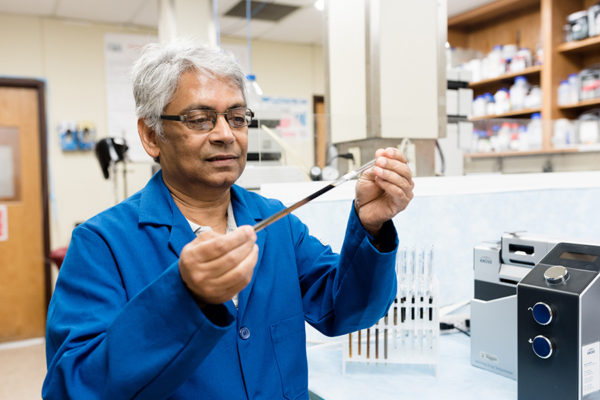AUSTIN, Texas — The U.S. Department of Energy (DOE) is investing $8 million in engineering research at The University of Texas at Austin that aims to create a more efficient process for recovering oil from naturally fractured reservoirs using engineered water. Water flooding is currently the cheapest and safest method, but also one of the least efficient in naturally fractured reservoirs. Finding new ways to make water-based enhanced oil recovery (EOR) more efficient and effective will help safeguard U.S. energy independence into the future.
Led by Kishore Mohanty, a professor in the Hildebrand Department of Petroleum and Geosystems Engineering in the Cockrell School of Engineering and director of the UT Center for Petroleum and Geosystems Engineering, the research team, which also includes two other Co-PIs from the same department, professors Michael Pyrcz and Wen Song, is investigating the efficiency of EOR techniques in fractured reservoirs that are injected with water engineered with ionic modifications, surfactants and nanoparticles. They believe that by making slight changes to water composition, they can improve its capacity to stick to carbonate minerals, thereby helping the water to be absorbed and easing the process of expelling the oil from the matrix. The UT Austin team will field-test the new technology in a West Texas naturally fractured oil-wet carbonate reservoir.
There are a number of different EOR techniques currently used by industry, with gas and thermal recovery being the most common. Injecting water into an oil reservoir remains one of the cheapest methods, but it does not yield efficient returns in fractured carbonates, in some cases recovering as little as 20% of what is projected to be in place.
“Only around 20% of oil can be reached successfully in naturally fractured reservoirs using current water-flooding methods, meaning we leave more than three-quarters behind,” said Mohanty. “We believe injecting water that is engineered with ionic and chemical modifications will improve oil recovery efficiencies from fractured carbonates and lead to the discovery of even more energy in West Texas and beyond.”
Mohanty is a leading global authority in EOR techniques and is regularly called upon by national and international energy producers for his expertise. The DOE Office of Fossil Energy recruited the Texas Engineer as part of its basin-specific research strategy focused on increasing ultimate recovery and operational efficiency. This $8 million, four-year investment is part of a wider national DOE program known as the Advanced Technologies for Enhanced Oil Recovery initiative, which will provide federal funding to five research and development projects across the U.S. at a total cost of $39.9 million.




